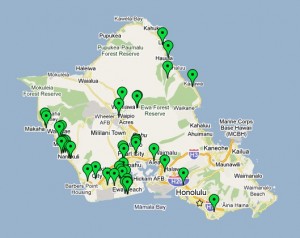Just a quick post here regarding the recent “robo-signing” that’s gripped the nation’s foreclosure landscape. As most of you know, quite a few of the country’s top mortgage lenders have reduced or outright stopped pursuing foreclosures for the time being in some or all states. Bank of America, the nation’s top lender, put a halt to its foreclosures in all 50 states. If you didn’t see, Hawaii was recently ranked 10th in the nation in foreclosures per capita, so the lenders’ actions in the aftermath of this report will have a significant impact on the Hawaii real estate market.
What happened? Well, it turns out that the necessary checks and balances that ought to be adhered to when foreclosing on someone’s home were being given little more than what amounts to a quick glance and a few strokes of the pen in an effort to mass-process the growing amount of foreclosures coming through the pipeline. When this became known the general public, the backlash was too great to ignore and the lenders hit the brakes for at least the near term.
Foreclosing on someone’s home is a serious matter. Homeowners in this situation have likely been thrown a curveball in some form — reduced or lost employment, divorce, illness, decrease in rents for second homes, etc. — and have hopefully made an honest effort to avoid the situation but have been unlikely to do so. I think they deserve to know that, although the foreclosure in their situation is unfortunately the end of the line, the process by which it happens has at least been given the proper attention and scrutiny. They are still people with property, not just names on documents. I appreciate the effort by lenders to expedite their procedures given the large numbers of foreclosures in the works, but if a slower process is what’s required to make sure that all the i’s are dotted and t’s crossed, then so be it.
However, in light of the public misgivings against the lenders named in the robo-signing fiasco, I think it’s important to remember that it’s not the criteria of foreclosure that’s being questioned, just the process by which they are processed. If homeowners have not made up the arrears or come to terms with the lenders on a loan modification for their property, then they likely fit the criteria upon which the lenders choose to foreclose, no matter whether they are ‘robo-signed’ or not. That’s not being questioned and it’s not to sound harsh, but we need to be clear about what the problem is and what it is not. Even with the robo-signing, if you don’t pay your mortgage you’ll ultimately be foreclosed upon.
So what does this mean to Hawaii? Well, it depends on who you are and where on the islands you live. Homeowner Joe about to lose his house in Honolulu may get a temporary reprieve in which to come to terms to avoid the impending foreclosure, but will ultimately lose his home anyway if he doesn’t. Homeowner Sue in Ewa Beach actually wants these foreclosures to happen sooner than later so that new owners move in to otherwise vacant or rundown properties and help improve the neighborhood.
This is important Hawaii real estate information for investors as well. As of this morning’s writing, there were 58 actively listed REO (bank-owned) properties on Oahu. Most of these are between Pearl City and Waianae, with the bulk of them in the Kapolei / Ewa Beach area. That’s no surprise to anyone that lives here. If the number of REO properties coming on the market slows down, the investor competition for those currently listed is likely to build — simple supply and demand. A likely result of this is that growing competition for a smaller supply of REO properties will send many investors elsewhere where more profitable deals may await — bankruptcies, preforeclosure / short sales, vacant land or even properties outside of Hawaii itself. Many locals prefer to invest in mainland markets. However, since real estate investors usually renovate their REO properties before putting them back on the market, thereby increasing neighborhood aesthetics and overall value, it would be unfortunate to push them away from REOs.
What are your thoughts on this latest bit of Hawaii real estate information? What were your initial reactions when you read about the lenders actions? How is this affecting you and your neighborhood?


“House prices are going to fall more next spring and that will bring more negative equity,’’ Fleming said.
It has almost always been my opinion that it was the lack of government over sight of the mortgage/banking industry that caused the problem. For those that are calling for the breakup of fanny/Freddy, I think you are miss guided. Both Wall Street and the GSI’s were greedy, nothing more. Wall st via fees and the GSI’s via yield. Both have strong lobbyist arms which have deep and troubling influence. The public was, at the highest levels of government and wall st miss lead. This is not giving the public a pass on being stupid, but the piper played and everyone went along. You will never have a strong consumer advocate government while you have over whelming corporate lobbyist influence over our elected officials. To those of you who still subscribe to laissez-faire capitalism, until you control greed and ignorance, you will continue to doom us to these cycles of boom and bust. Ayn Rands mind set will continue to fail.It is a mess no doubt and with any luck our current government will make good decisions to do the “right” thing and teach people how to fish again so we can get out of this mess!!! They no doubt will hold the largest influence in the solution as it continues to unfold. I know one thing is for certain and that is to get informed and VOTE!!